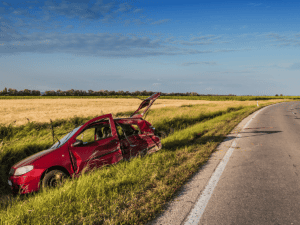You were seriously injured in an accident when your vehicle crashed, now your medical bills mounting as well. Oftentimes people hear that when an accident occurs someone else's car insurance has paid for their medical expenses for the accident. How did their medical bills get paid? Can I get paid for my health care expenses? How? Are you having trouble paying medical bills and believe someone else is responsible for paying them after a car crash? The purpose of this article is to respond to these vital questions and show you how medical bills are paid after a car accident.
The at-fault insurance company is responsible for damages
California has a typical fault based system, meaning the driver responsible for the collision has financial liability resulting from the accident. Hopefully the driver has valid insurance coverage to pay for their irresponsible driving behavior. Drivers need insurance. Under California laws, insurance coverage must be available for any motor vehicle driven within the State. Once fault has been determined, a motorist's insurance company is may be required to pay damages in the form of money compensation. Compensation in these cases typically comprises health care and other costs in addition to other considerations like the damage caused to your property or vehicles, the loss of wages and the like.
Timing of Payments By the At-Fault Party Insurance
Auto accident liability insurance policies pay out one lump sum of compensation at the end of the claim. Once the big lump sum is paid, the claim and lawsuit are usually over forever. This means that during the claims process, which could last from months to years, the at-fault parties insurance won't be making ongoing payments to providers.
Seek Medical Attention, No Matter What
If you have been in a car accident, it is important to seek medical attention as soon as possible. Do not let having no insurance stop you from compensation for your injuries. Once you have received medical treatment, you should contact an experienced car accident lawyer at our law firm to discuss your options for reimbursement of your medical expenses. Keep reading to learn more about the different ways how medical are bills paid after a car accident.
Your medical bills are your obligation
When you are involved in a personal injury case, you are obligated to pay your own medical bills. Similar is true for your child's expenses. This is true even if the accident was not your fault.
In a “fault” state, the at-fault driver's insurance company should reimburse you for your medical expenses. If the at-fault driver does not have insurance, or if their insurance is not enough to cover your expenses, you may be able to seek reimbursement from your own insurance company if you have uninsured/underinsured motorist coverage. Check out this important article on what you need to know about Uninsured Motorist Bodily Injury.
Health insurance, primary and secondary coverage
If you do not have health insurance plan, you will be responsible for the entire bill. If you have health insurance, your provider will likely bill your insurance company first and then send you a bill for any amount not covered by your policy, such as a deductible or co-pay.
Your health insurance is your primary coverage. This means that your health insurer will pay its portion of the bill first, and then send you a bill for any remaining balance. If you have secondary coverage, such as through a spouse's policy, that company will reimburse the primary insurer for its share of the expenses, up to the limits
The most common type of secondary coverage is usually purchased through your automobile insurance policy. This coverage is known as Medical Payment Coverage or Med Pay for Short. You should speak to your auto accident insurance company about your personal injury in the car crash. The insurance adjuster should guide you on how to submit your medical bills from the accident for medical payments for the personal injury medical bills.
Medical Payment Coverage (Med Pay)
Medical Payment Coverage (Med Pay) is another type of car insurance that can help pay your medical bills after a car accident. Unlike liability insurance, Med Pay is not based on “fault.” This means that even if you caused the accident, your own Med Pay coverage will pay some of your medical expenses.
Med Pay can cover medical costs that your primary health insurance doesn't cover. Things like co-pays, ambulance bills, emergency medical transport costs (EMT), non-emergency medical transport costs (NEMT), and even private bills not covered by your insurance (chiropractors, physical therapists, acupuncturists).
The insurer is entitled to reimbursement from settlement proceeds
Once your medical bills have been paid, the insurer is entitled to reimbursement from the at-fault driver's insurance company. How this works will depend on the state in which you live. In California, health insurance providers and medical payment coverage policies are entitled to reimbursement.
A Note On ERISA Funded Health Plans
You may have to pay back your health insurance company or auto insurance policy from settlement proceeds. Usually these amounts are negotiable. If you used an ERISA funded health plan, your employer's plan is entitled to 100% reimbursement from the auto accident settlement proceeds.
What about medical liens or certified hospital liens?
Medical liens are similar to the right to reimbursement by healthcare insurance companies and medical payment coverage. Usually a medical lien is a legal right to reimbursement from your settlement that you assign to a medical provider in exchange for medical services.
Medical Treatment on Liens
Medical Treatment on a lien is often procured by the injury victim when they have no health insurance or where health insurance is inadequate. For example, someone with Kaiser insurance will not receive the type of attention that a private local chiropractor can give to the injury victim right away. A Kaiser member might choose to procure some treatment from private health providers like chiropractors, physical therapists, diagnostic testing, etc.
Certified Hospital Liens
Some states allow hospitals to pay accident victims medical expenses and lien on their eventual verdict. This is called a lien. When treating accident patients without adequate coverage, the hospital often asks them to sign lien papers. The letter grants hospitals permission to recover compensation for personal injury damages. Accidental victims whose lien is signed don't have to be paid upfront in order to receive medical care. However, medical institutions that own the lien can recover the cost of all the verdicts or settlements.
Legal Advice About Paying Medical Bills After An Auto Accident
We hope this helped you understand how medical bills are paid after a car accident. The information in this blog article is general in nature for victims of personal injury after an auto accident. It is meant to be educational, but it is not legal advice. So that you can learn more about your situation when you speak with a personal injury lawyer to get legal advice. Don't make any decisions without first consulting with an auto accident lawyer about how to pay these medical bills after an auto accident. Napolin Accident Injury Lawyer should be called immediately after an auto accident involving injuries – 866-NAPOLIN.
Starting an Attorney-Client Relationship Is Free
All calls are free and confidential. And we take cases without any money up front on a contingency fee relationship. Our lawyers help file the claim as well, so if you need a lawyer right after a crash because of an injury, give us a call at 866-NAPOLIN for a free consultation.
- Understanding Uber Accidents and Insurance Coverage Periods in California - April 8, 2025
- A Guide on Red Light Auto Accidents in California - August 14, 2024
- Self-Representing in a California Personal Injury Claim - August 13, 2024



